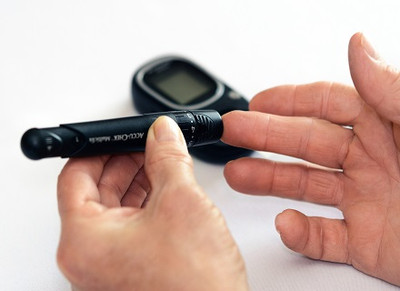Posted by James Hoad on 6th Feb 2020
What is Diabetes?
Diabetes is a lifelong disease that occurs when your blood glucose, also known as blood sugar, is too high. Blood glucose is the bodies main source of energy and comes from the food you eat. Insulin, a hormone made by the pancreas, helps glucose from the food you eat to get into the cells to be used for energy.
Diabetics suffer from these blood glucose highs because their bodies struggle to or can't produce enough effective insulin.
There are 3 main types of diabetes:
Type 1: With type 1, you cannot produce insulin. This is because the body’s immune system attacks and destroys the cells that produce it.
Type 2: With type 2, the insulin you do make can’t work effectively because the body cells don’t react properly, or not enough is produced. Type 2 is the most common variation.
Gestational: This can develop in some pregnant women. With the heavy demand on the body, there is a possibility it is unable to produce enough insulin to absorb the high levels of blood sugar. It normally goes away after birth but women who have had it are more prone to developing type 2 diabetes in the future.
Key Facts & Figures
- 4.7 million people in the UK have a form of diabetes
- A patient in diagnosed with diabetes every three minutes
- More than 10,000 people in the UK developed end stage kidney failure because of diabetes
- At least 2000 people in the UK have their eye sight affected by diabetes
- The amount of people diagnosed with diabetes has more than doubled in the past 20 years
Symptoms of Diabetes
The most common signs of diabetes are:
- Weight loss
- Slow healing wounds
- Lethargy and blurred vision
- Abnormally thirsty
- Frequent urination

Many people suffering from diabetes can go years before being diagnosed with type 2 diabetes due to the mild and fairly slow release of symptoms if any. Its been estimated that over 1 million people in the UK have diabetes and do not know it, whilst 60% of diagnosis's are patients who are not experiencing symptoms.
How Does Diabetes Affect You Body?
High levels of glucose in your blood will cause serious damage to certain parts of the body over an extended period of time. High blood sugar concentrations will damage blood vessels over time and can disrupt blood flow to areas of the body that demand a high consistent flow e.g your heart, eyes, kidneys and feet.
How To Live With Diabetes
With the right approach and lifestyle, these complications can be prevented or at least delayed. The easiest ways to prevent or delay diabetes is through cutting out smoking, reducing the fatty foods you eat and doing regular exercise.
Food & Diet
A healthy balanced diet is important for everyone but even more so for those affected by diabetes. Whilst you can still enjoy eating your favourite foods and drinks, it is important to make a conscious effort to reduce the intake of certain foods to make life easier.

It is a good idea to replace soft drinks with sugar-free alternatives or get your sugars from natural sources such as fruits and vegetables. Drinking plenty of water (around 2L per day) can not only reduce the effects of fatigue but it also reduces cravings for snacks and sugary drinks. This 2 Litres per day can be made up of water alone, tea, coffee, juice or any other beverage consisting of mostly water.
Creating meal plans can reduce the chances of last minute takeaways as well as allow you to track the nutrients you are consuming on a daily basis. This plan should consist of foods low in saturated or trans fat as well as having lower salt contents due to the high blood pressure diabetics are prone to.
Most importantly it is best to always have more frequent smaller meals to keep your blood glucose levels consistent and avoid sugar high and lows with meals that are far apart.
Physical Activity & Exercise

Living a healthy active lifestyle is very important to help manage your blood glucose levels, lower your blood pressure and improve general blood flow. Type 1 diabetics should note that depending on the intensity of exercise you do, it can cause your blood glucose levels to rise or fall.
Moderately intense exercise over an extended period of rime such as walking or cycling may result in a slow drop in levels.
Higher intensity exercise such as playing football or running may cause your levels to rise over time. With this in mind, it is important to eat carbohydrates before, during and after exercise to fuel your body as well as monitor your blood glucose levels.



